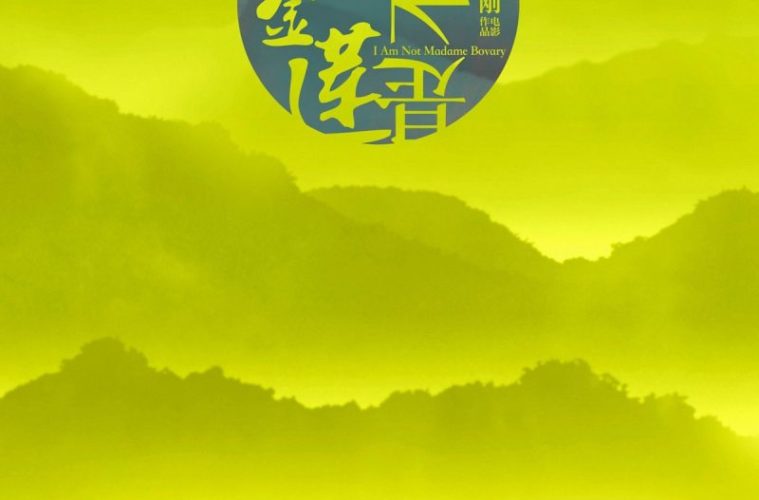A couple of months ago, we noted how it’s been a seriously underwhelming year for Chinese-language cinema – an assessment that stands despite the recent release of Berlinale-winner Crosscurrent. Well, turns out the Middle Kingdom might have a year-end surprise or two up its sleeve after all. Having scored a FIPRESCI prize at Toronto and the prestigious Golden Seashell at San Sebastián, I Am Not Madame Bovary is a healthy return to form for veteran director Xiaogang Feng that, while not exactly hitting the ball out of the park, delivers a genuinely funny, slyly observant diagnosis of contemporary China complete with lush, absurdist flair.
The many cultural references that give a societal satire like this its texture but inevitably get lost in translation begin with the title. Instead of Flaubert’s world-known creation, it’s actually Pan Jinlian that our heroine Li Xuelian (played by Bingbing Fan) denies of being. This other literary figure from 17th century Chinese classics enjoys a perhaps even higher level of fame/notoriety and has become a derogatory term for unfaithful, conniving women under China’s good ol’ patriarchal tradition. Using a series of oil paintings in the style of antique erotica, the movie briefly illustrates the story of Pan Jinlian. For the native audience this might have been superfluous, but the cheeky, visually peculiar opening sure prepares you for the curiosities ahead.

Informed by the narrator, we learn that things started over ten years ago with a legal dispute. Ms. Li, bracing pouring rain, boats into view and looks up a judge she hopes can help her divorce her already divorced ex-husband – again. The cuckoo-sounding premise blossoms into a plot as we find out the reason for her travails and follow this plain, determined farmeress making her case up the bureaucratic ladder all the way to Beijing. A decade would pass, during which names would be called, hearts would be broken anew and the will to fight would be rekindled. But most importantly, the clumsiness with which a totalitarian regime in transition treats its suddenly important subjects would be exploited to great hilarity.
Adapted by Zhenyun Liu from his own novel, I Am Not Madame Bovary cleverly settles on a storyline that’s neither overtly pro- or anti-government, an oversimplified distinction that nevertheless often determines the fate of Chinese productions with political content. On the one hand, it shows enough grit to take digs at an obsolete state machinery plagued by inefficiency and old thinking. On the other hand, it does so without adopting an accusatory tone, opting instead to observe the escalating follies with the bemused confidence of a newly empowered citizenry. So when we see how the county judge tries to put rule of law into practice and holds a comically inadequate hearing on Ms. Li’s unusual divorce case, or when mayors and governors alike break out in a clueless sweat over this lady none of them knows what to do with, the joke is on the once intimidating system now trying awkwardly to play catch-up – the sarcasm is strong, but its tone benign.
Like his compatriots Yimou Zhang, Kaige Chen and Wen Jiang among others, Feng belongs to the first wave of post-Cultural Revolution filmmakers commonly labelled China’s “fifth generation” of directors. Having lived through the cataclysmic event helps ground their work in utter authenticity and sharpen their sensitivity towards the plights and joys of the little people. And while Zhang and Co. largely made their names doing hard-hitting, award-winning dramas, Feng used that special insight for comedies and became best known for them. His dead-on command of everyday parlance and its nuances is on vivid display here (if only partially relayed via subtitles), sending verbal sparks flying through vernacular, intonation, cadence and innuendoes. The (mis-)communication between characters of different backgrounds and social standings rings true at every turn and provides constant delight.

What proves more surprising is Feng’s pursuit of a more outward, situational comedy, as well as a formally experimental style. Taking a step away from his strictly talky romcom extraordinaire If You Are the One, he throws elements of Stephen Chow slapstick and Coen-esque quirkiness into the mix to give the film some bona fide laugh-out-loud moments. When law enforcement and party functionaries eventually pull out all the stops to catch a rogue peasant woman, for example, there’s a decided jolt of Hollywood theatricality that kicks things nicely into high gear. But the most striking sign of mid-career self-invention must be the bold visualization of Bovary. As foretold by the trailer, about half the movie is projected onto a circular field of vision in the middle of the screen, as if seen through a peephole or under the telescope. The other half of the time – whenever the story moves to Beijing, that is – the circle quietly morphs into an equally unconventional oblong, blocking out most of the spaces left and right. It’s not immediately clear why Feng chose such atypical formats, except, on an instinctive level, they add to the overall playful, slightly fantastical air of the narrative and further soften its edge. Moreover, this creates the illusion of reading a comic strip frame by frame that is strengthened by the absolutely lovely production design subtly color-coordinating everything. A few niftily executed sequences are so meticulous in their design and eccentrically staged, in fact, they carry with them a whiff of Wes Anderson.
All this is to say that, to the relief of Chinese film enthusiasts everywhere, I Am Not Madame Bovary offers an alternative to the glut of blandly commercial or dire arthouse wannabes hailing from the Far East this year. An overlong mid-section stagnates after the novelty of the premise wears off, but a couple of plot twists late in the game raise the stakes again and Xiaogang Feng, with his signature dry humor and newfound creative juices, hits too many marks on this one for it to disappoint.
I Am Not Madame Bovary opens in limited release on Friday, November 18.

